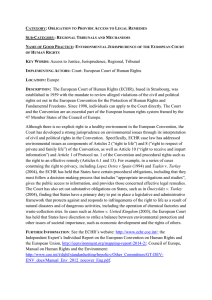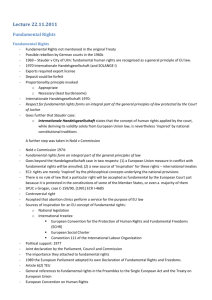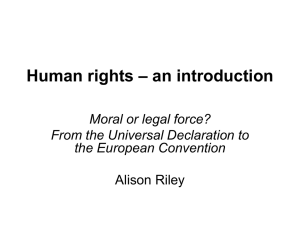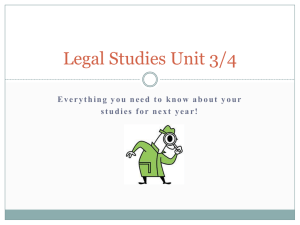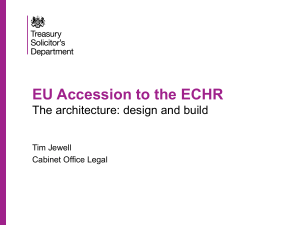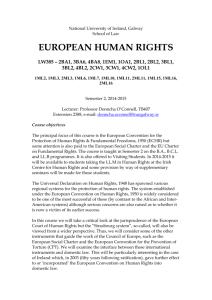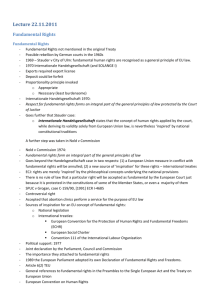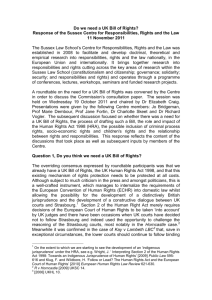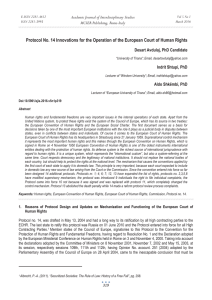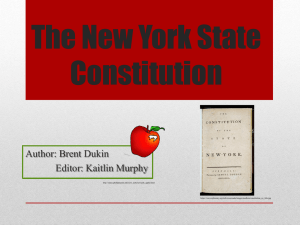The British constitution and human rights protection
advertisement
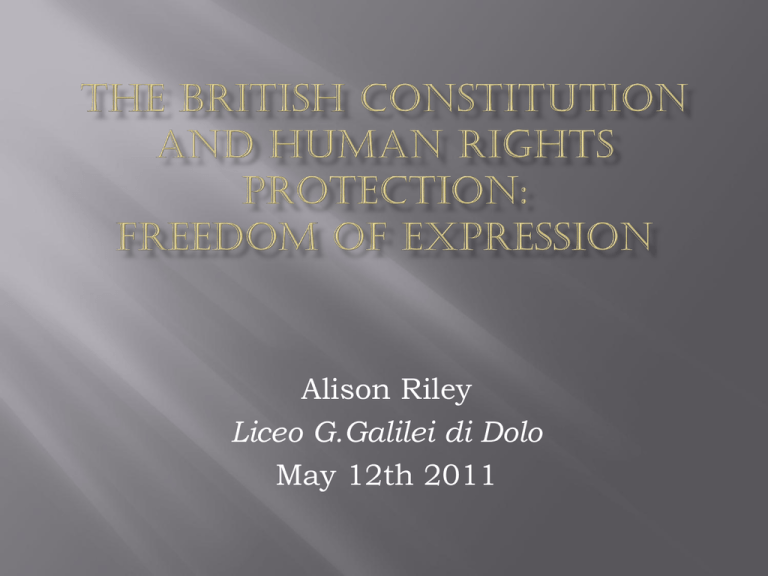
Alison Riley Liceo G.Galilei di Dolo May 12th 2011 Task - choose one or two newspaper extracts: What can you see in the picture? Describe the people and actions. Read the text. Have the people in the news committed any crimes? Do you think the public authorities have violated their human rights? Which rights? Could this happen in your country? (Are you sure?) What is the source of your legal rights? And if you went to Britain? Task - examine some extracts from: The European Convention on Human Rights The Universal Declaration of Human Rights Amnesty International letter of appeal Franklin Roosevelt’s speech: Four Freedoms John Stuart Mill On Liberty – On Freedom of Expression of Opinion The American Declaration of Independence The Bill of Rights 1689 • the system of rules defining the composition, powers and relations of the state organs: the legislature, the executive, the judiciary the head of state: the monarch (UK) The system of rules regulating relations between the state and individuals: civil liberties, individual rights and duties the scope and limits of state powers in relation to the individual It has evolved gradually over many centuries There has been no act of foundation: after a war, revolution, crisis It is unwritten: Not established in a single written instrument It has a variety of different sources: Legislation, judicial precedent (common law), conventions, custom, European Union (EU) law, ECHR law, and others It is flexible, not entrenched: there is no special legislative procedure for reform Principles pronounced by judges in precedents must be followed in later, similar cases – they are a primary source of law The British constitution has no written charter of rights (no ‘Bill of Rights’) The courts have traditionally defended the rights of the individual against state But Parliament can pass laws that restrict or change the rules of precedent, including human rights In the case of: Rice v Connolly “Though every citizen has a moral duty to assist the police … there is no legal duty. The whole basis of the common law is the right of the individual to refuse to answer questions put to him by persons in authority, and to refuse to accompany [them], short, of course, of arrest.” Lord Chief Justice Parker High Court of Justice 1966 People are free to do whatever they want So long as it does not conflict with a particular law Example: freedom of speech – you can say what you want, but: You must not reveal an official secret contrary to the Official Secrets Act 1989 You must not incite racial hatred contrary to the Public Order Act 1984 You can say what you want, but: If you defame the reputation of another person, he may take legal action against you: For money compensation (damages) For an injunction (a court order that you must stop or interrupt your defamation, must not publish defamatory material, etc.) If you break the terms of the injunction you may be sent to prison and ordered to pay a fine for ‘contempt of court’. Defences: truth, fair comment Primary legislation is enacted by ‘the Queen in Parliament’: Acts of Parliament are also called statutes, laws, enactments Parliament is sovereign – it can enact any law it decides (in theory) Statute law has priority over common law in case of conflict Statute is the most important source of the British constitution today: Some major constitutional reforms under Tony Blair/Labour: Human Rights Act 1998 Constitutional Reform Act 2005 (transfers the judicial function of the House of Lords to a new Supreme Court of the UK) The ECHR becomes a direct part of British law Entry into force: 2000 British lawyers helped draft the text Many rights and freedoms are based on principles of the common law The UK was the first state to ratify the Convention It came into force in 1953 But no national legislation for almost 50 years (HRA 1998) Came into force in the year 2000 Incorporated the European Convention on Human Rights directly into British law Has given the judges a more sensitive role All public authorities must now act compatibly with Convention rights (but not Parliament) A victim can take action directly before the British courts for a violation of Convention rights and seek a remedy Victims can make individual applications to the Court Art.34 ECHR First, national remedies Art. 35 ECHR The Court can find that a State Party has violated the Convention The Court can grant ‘just satisfaction’ to the victim’: Money compensation (Art. 41) The judgment has binding force The Committee of Ministers supervises execution (Art. 46) THE STATE MUST CHANGE NATIONAL LAW 1 Everyone has the right to freedom of expression. This right shall include freedom to hold opinions and to receive and impart information and ideas without interference by public authority and regardless of frontiers. This article shall not prevent States from requiring the licensing of broadcasting, television or cinema enterprises. 2 The exercise of these freedoms, since it carries with it duties and responsibilities, may be subject to such formalities, conditions, restrictions or penalties as are prescribed by law and are necessary in a democratic society, in the interests of national security, territorial integrity or public safety, for the prevention of disorder or crime, for the protection of health or morals, for the protection of the reputation or rights of others, for preventing the disclosure of information received in confidence, or for maintaining the authority and impartiality of the judiciary. Limits are only permissible for: national security, territorial integrity or public safety, prevention of disorder or crime, protection of health or morals, protection of the reputation or rights of others, for preventing the disclosure of information received in confidence, for maintaining the authority and impartiality of the judiciary The Strasbourg Court must perform a balancing exercise: Are the means employed (the interference) justified by the end (the objective, e.g. national security)? UK national courts must now use the same approach The Court must also decide between competing interests: Whose interest should prevail? Which interest should be protected? “A judge has banned the media from reporting whether or not a criminal court has even sat under a ‘very rare’ secrecy order.” A journalist who reports details of the order - or even the fact that a hearing has taken place - could be punished for contempt of court with: A fine (money penalty) Prison (one month) What could justify this restriction on freedom of the press? Openness and transparency are key elements of the criminal justice system BUT IN THIS CASE: Restrictions were imposed after the judge heard strong evidence that the life of one of the participants (in the case) would be “in grave and immediate danger if any details of the hearing were published”. Consult Article 10(2) ECHR : what limit justifies the court’s decision to impose press silence? Whose are the competing interests in this case? And what are those interests? Do you agree with this limitation on the freedom of expression? What dangers can you see if press freedom is limited like this? Think of some other recent examples to compare and discuss Peter Leyland “The Constitution of the United Kingdom. A Contextual Analysis” (Freedom of expression, pages 3-6; Chapter 2 Sources of the Constitution; Chapter 7 Part III The Courts and the Human Rights Act 1998) Alison Riley “Legal English and the Common Law” (Chapter 3.4, The European Convention on Human Rights, pages 125-137; Chapter 3.6 L’Italia e la Convenzione europea per i diritti dell’uomo, di Serena Forlati, pages 147-151) Hart Publishing, Oxford (2007) Cedam, Padova (2008) Official websites of: Amnesty International The Council of Europe The European Court of Human Rights The Supreme Court of the United Kingdom
